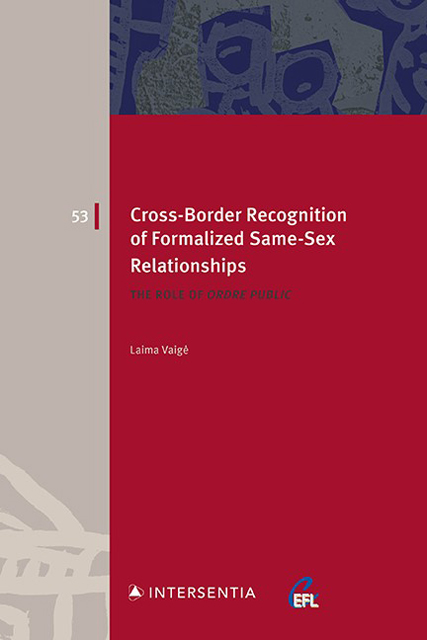Book contents
- Frontmatter
- Preface
- Contents
- List of Abbreviations
- Special Terminology
- List of Legislation and Other Instruments
- List of Cases
- Part I Setting the Stage
- Part II The Ordre Public in the Baltic States and Poland
- Part III The European and the EU Ordre Public
- Part IV Legal Effects of Formalized Same-Sex Relationships: National and Supranational Law
- Part V Law in Context
- Bibliography
- Index
- About the Author
- European Family Law Series
Chapter 2 - The Theory on Ordre Public in Private International Law
Published online by Cambridge University Press: 20 April 2023
- Frontmatter
- Preface
- Contents
- List of Abbreviations
- Special Terminology
- List of Legislation and Other Instruments
- List of Cases
- Part I Setting the Stage
- Part II The Ordre Public in the Baltic States and Poland
- Part III The European and the EU Ordre Public
- Part IV Legal Effects of Formalized Same-Sex Relationships: National and Supranational Law
- Part V Law in Context
- Bibliography
- Index
- About the Author
- European Family Law Series
Summary
Introduction to the Chapter
This chapter is aimed at readers interested in theory of private international law, and in particular, the theoretic understanding of the concept of ordre public. Specific rules of national or European law, or case-law of supranational European courts, are only mentioned in this particular chapter for the sake of illustration of the theoretic discussion. A more in-depth analysis can be found in other relevant chapters. Here, traditional theoretic understanding of ordre public in private international law and its internal limitations are discussed ( section 2.2 ). The restrictions on the national use of the ordre public safeguard are overviewed ( section 2.3 ) and the sui generis notion of the European ordre public is introduced next ( section 2.4 ). Concepts of qualification and incidental question are analysed in relation to ordre public ( section 2.5 ). The chapter finishes with concluding remarks ( section 2.6 ). Throughout the chapter, the analysis includes a critical approach to tendencies of overusing ordre public.
National Use and Understanding of the Ordre Public Reservation
The Traditional Concept of Ordre Public
The ordre public safeguard is traditionally understood as a measure used by authorities of the forum State in exceptional cases, when the result of applying otherwise applicable foreign law would be “shocking” in the respective State because of the contradiction to its fundamental policies. The ordre public reservation aims to protect only the most important principles of justice of the State of the forum, which could be infringed as a result of application of foreign law in a concrete situation. This allows for the possibility to refuse the recognition of a family status that would manifestly infringe ordre public of the State.
In evaluating whether the criteria for the use of ordre public are fulfilled, the national standards of the forum have traditionally been decisive. This understanding could be claimed as still relevant. Ralf Michaels writes that it can be “disheartening” to understand that private international law can never be completely neutral in respect of value judgements:
Private international law, like the substantive laws between which it mediates, does not present a holistic view, but instead happens from a certain perspective.
- Type
- Chapter
- Information
- Cross-Border Recognition of Formalized Same-Sex RelationshipsThe Role of <i>Ordre Public</i>, pp. 35 - 64Publisher: IntersentiaPrint publication year: 2022



